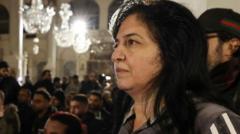Protests have erupted throughout Syria in reaction to the burning of a Christmas tree in the central town of Suqaylabiyah, which boasts a predominantly Christian population. The shocking act, captured in a video that circulated on social media, showed masked assailants igniting the tree in the town's main square. The Islamist faction emerging as the new authority in Syria, which played a pivotal role in the recent ousting of President Bashar al-Assad, claimed the perpetrators were foreign fighters and promised swift repairs to the damaged tree.
In the aftermath, thousands took to the streets demanding that the newly established Islamist government ensure the protection of religious minorities. In Damascus’ Bab Touma neighborhood, protesters brandished a cross and Syrian flags, chanting passionate slogans such as "we will sacrifice our souls for our cross." One demonstrator, Georges, articulated the collective sentiment: "If we're not allowed to live our Christian faith in our country, as we used to, then we don't belong here anymore."
Syria has long been a mosaic of various ethnic and religious communities, including Kurds, Armenians, Assyrians, Christians, Druze, Alawite Shia, and Arab Sunnis—the latter forming the majority of the Muslim populace. Just weeks ago, the Assad family's more than 50-year hold on power was disrupted by the uprising, leading to the question of how the Hayat Tahrir al-Sham (HTS) group will navigate governance.
While HTS has attempted to distance itself from its jihadist roots, the coming leadership must contend with its current Islamist standing, which raises concerns for the country's pluralistic fabric. Leaders of HTS have expressed intentions to foster a Syria that accommodates all citizens, pledging to safeguard the rights and freedoms of minorities. However, the organization remains classified as a terrorist group by major international stakeholders including the UN, US, EU, and UK.
Recent developments also indicate a shift in diplomatic relations, as evidenced by the United States' decision to lift the $10 million bounty on HTS leader Ahmed al-Sharaa amidst discussions with group representatives. Meanwhile, the US maintains its military presence in Syria, recently conducting airstrikes in the city of Deir Ezzor that reportedly eliminated two ISIS operatives.
As the new Islamist governance takes shape, the presence of foreign fighters and extremist factions like ISIS represent significant threats to stability. The plight of Syria's minorities underscores the urgent need for secure conditions as the nation grapples with its evolving identity and future possibilities.



















